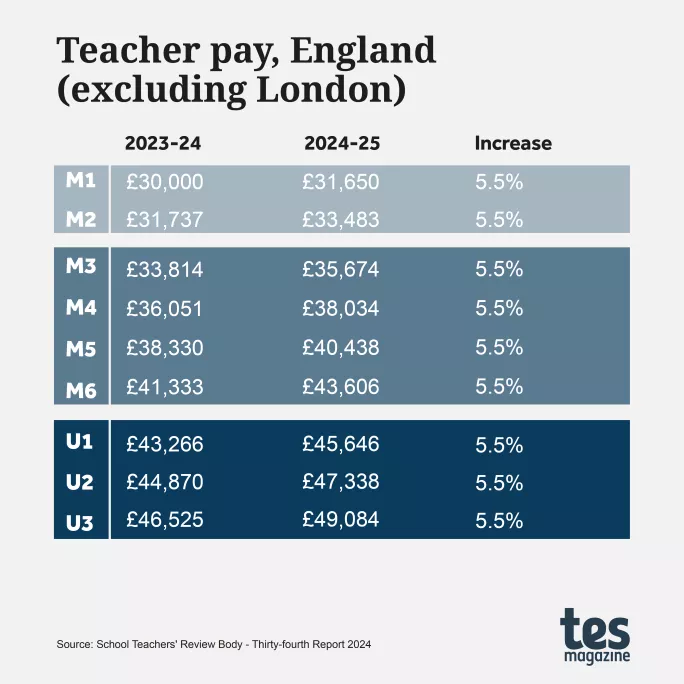Teacher pay rise 2024-25: all you need to know

The Department for Education (DfE) has announced that teachers and leaders will receive a 5.5 per cent pay rise from September 2024.
The DfE made the announcement after accepting recommendations made by the independent School Teachers’ Review Body (STRB).
It comes after teachers received a 6.5 per cent pay rise last year, following a month-long dispute between unions and the government, and as schools struggle with severe teacher shortages.
Here’s everything you need to know:
1. What pay rise has the government awarded to teachers?
The government accepted the STRB’s recommendation that teacher pay should rise by 5.5 per cent for teachers in England from September this year.
In May, former education secretary Gillian Keegan said the government would not publish its response to the STRB recommendations until after the election, meaning a decision on teacher pay would be left to the next government.
This came three months after the DfE had called for the STRB to recommend a “more sustainable” pay rise for 2024-25.
Under the latest pay announcement, teachers’ starting salaries outside London and the fringe will reach £31,650. The pay point for the upper pay range 1 will increase to £45,646.
The pay range for leadership will be between £49,781 and £138,265 outside of London.
- Teacher pay scales 2024-25: What will your salary look like?
- Pay: Teachers to get 5.5% rise
- Teacher shortages: DfE considers review of profession
2. When will teachers receive their pay rise?
The pay award will come into effect following a 10-week government consultation - the award will then be backdated to 1 September.
The consultation will address the government’s response to the STRB’S recommendations and will include the bodies that have a legal right to be consulted - which are mainly unions.
3. Is the pay deal fully funded?
The government has said the pay deal will be fully funded at a national level.
The STRB said it estimated its recommendations would increase the pay bill by approximately £1.65 billion for mainstream schools.
The DfE has said that schools - including mainstream, special and alternative provision - will be provided with almost £1.1 billion in additional funding to support them with overall costs in 2024-25.
The DfE will also provide an additional £97 million for schools delivering post-16 education and £34 million for schools delivering early years provision.
In total, this is an increase in funding of almost £1.2 billion.
This will all be provided through the new core schools budget grant (CSBG). Core revenue funding for schools and high needs will total over £61.8 billion in 2024-25, the DfE has said.
The new grant is based on a combination of per-pupil allocation, a lump sum and weighting for disadvantaged pupils.
The grant funding the DfE has announced will only cover the first seven-twelfths of the full-year cost of the award up to March 2025, as the impact of the teacher pay award will span into the next financial year.

4. Will the deal be affordable for schools?
The education secretary said the extra funding is what the DfE has calculated is needed to fully fund the teacher pay award and support staff pay offer “over and above the available headroom in schools’ existing budgets”.
Under the former government, the DfE calculated there was £600 million spending headroom in school budgets for 2024-25.
Luke Sibieta, Institute for Fiscal Studies (IFS) research fellow, said the government “seems to have assumed that schools in England could afford pay rises of 2 per cent for teachers and support staff from existing budgets”, which “seems reasonable given estimates of schools’ costs published earlier this year”.
The extra money then covers the rest of the 5.5 per cent pay offer for teachers and the likely 4.5 per cent for support staff, he added.
While the £1.1 billion “does seem to accord with the likely costs of pay awards above 2 per cent at the national level this year”, Mr Sibieta said, “there will be some variation around that national average, with some schools still potentially seeing acute pressures on their budgets”.
5. Will the pay rise apply to all teachers in England?
The award applies to maintained schools across all pay scales and “will also be implemented in many academies at their discretion”.
Non-maintained schools have more freedom to set their own pay policies and do not have to follow the statutory arrangements in the School Teachers’ Pay and Conditions Document.
Many choose to follow the national deal, however it is not unusual for trusts to deviate from this, as set out by Tes’ MAT Tracker earlier this year.
Main pay scale for teachers in England (excluding London)

Find a full list of the teacher pay scales for 2024-25
6. What does the pay rise mean for teachers in real terms?
The 5.5 per cent pay rise is above the rate of inflation, which was at 2 per cent in the year to July 2024. Previous pay rises in 2022 and 2023 were below inflation, effectively meaning teachers suffered a pay cut in real terms.
However, the starting salary for teachers this September will be slightly lower than the real terms equivalent salary in 2020, and significantly lower than the equivalent between 2003 and 2010.
Find out more about teachers’ real terms pay
7. Are teaching unions likely to accept the pay deal?
Teaching union general secretaries have welcomed the fully funded pay offer.
Association of School and College Leaders (ASCL) general secretary Pepe Di’Iasio said the union will be “closely examining the detail to ensure the award will be genuinely affordable for schools”.
Daniel Kebede, general secretary of the biggest teaching union, the NEU teaching union, said: “Clearly, there is still some way to go to restore what teachers and school leaders have lost since 2010 and we will expect this to be addressed in future pay rounds.
“This announcement is however a strong signal to the profession about a new course of direction in education.”
Having met on Monday 5 August, the NEU’s national executive has recommended to its members that they accept the government’s offer of a 5.5 per cent increase.
The NEU said earlier this year that it would hold a snap poll for members to vote on any pay deal put forward by the Department for Education. That poll will now take place from 21 to 30 September.
8. Where is the extra money coming from?
The chancellor has announced several measures to make savings across government. This included scrapping the previous government’s plans to introduce the Advanced British Standard (ABS).
The DfE said scrapping the ABS will avoid a cumulative spending commitment of £3 billion by 2028-29.
Imran Tahir, research economist at the IFS said the previous government had promised around £100 million a year for teacher recruitment and £150 million to support resits.
The new government has promised to continue these, meaning it is “less clear where the planned £185 million of savings next year will come from,” Mr Tahir said.
A number of other programmes across government have also been axed.
The chancellor is also asking all departments to find savings, including 2 per cent savings in their back offices.

9. What about performance-related pay?
The requirement for schools to use the performance-related pay system will also be scrapped from September, the DfE said.
The DfE has issued guidance for schools on appraisals.
In addition, the DfE said it will clarify the position on planning, preparation and assessment (PPA) time to make it clear to schools that teachers can use this time at home.
The STRB said in its report that more proactive work on flexible working for teachers is needed.
It also suggested a more flexible application of allowances - such as letting teaching and learning responsibility (TLR) payments be paid in full to part-time teachers that carry out the whole role.
10. How did the STRB come to its decision?
The STRB report said it recommended 5.5 per cent to address the “structural deterioration” in the pay of teachers compared with similar professions and to improve recruitment and retention.
All STRB consultees had called for any pay award to be fully funded, due to the pressure on budgets. The pay review body estimated the pay bill increasing by 5.5 per cent would total approximately £1.65 billion over the next school year.
The STRB stated the teacher attrition rate “is concerning” and that supply challenges in the sector are influenced by pay.
11. When will the DfE’s budget be finalised?
The government will confirm finalised departmental budgets for this financial year and next at the budget on 30 October.
A multi-year spending review will conclude in spring 2025.
12. What will the pay deal mean for special schools?
Along with mainstream schools and alternative provision (AP), special schools will benefit from the additional £1.1 billion in funding.
This will be allocated by local authorities, apart from for non-maintained special schools, which will get their allocations directly from the Education and Skills Funding Agency (ESFA).
Local authority allocations will be confirmed in September 2024 and will be based on place numbers with an area cost adjustment. Local authorities will have flexibility in how they pass on funding allocations to special schools and AP.
However, special schools in general have a much higher proportion of support staff.
The offer to school support staff for 2024-25 is currently under negotiation. Support staff have been offered a pay increase from April 2024 of at least £1,290 from local government employers - equating to 5.77 per cent for the lowest paid.
However, unions representing support staff have urged members to reject the offer.
13. What could happen with future teacher pay awards?
In its report, the STRB said that, given the scale of the teacher supply problem, “we believe further action is required”.
The body said that, once the overall competitiveness of teacher pay has been addressed, it sees “a potential role for some degree of pay targeting by subject” to address subject-specific shortages.
The STRB recognises this would be controversial, and would need to be implemented fairly.
The STRB also stated in the report that it plans to carry out more benchmarking of teacher pay against comparable jobs to judge its competitiveness in future reports.
For the latest education news and analysis delivered directly to your inbox every weekday morning, sign up to the Tes Daily newsletter



